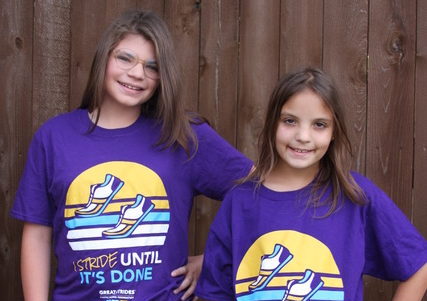
Following up on our facts about cystic fibrosis (CF) post for Cystic Fibrosis Awareness Month, we are sharing the story of sisters Melissa and Makayla, who are living with CF. Followers and supporters of Kidd’s Kids know that a Kidd’s Kids trip provides hope and happiness by creating beautiful memories for families of children with life-threatening and life-altering conditions. It allows the child and their families to forget about their illness for a few days, relax, and create FUN memories as a family. Once the trip is over and they return home, reality sets in again and they must continue their treatments, medications, and therapies.
Melissa and Makayla went on the Kidd’s Kids Trip with their parents, Traci and Paul, in 2017. Melissa is currently 12 (almost 13!), and Makayla is currently 9 years old and both were born with CF. During the pregnancy with Melissa, Traci and Paul found out they were both carriers of the CFTR gene mutation that causes CF. Each time two CF carriers have a child together there is a 25% chance the child will have CF, a 50% chance the child will be a carrier but not have CF, and a 25% chance the child will NOT be a carrier of the gene and will not have CF. When Melissa was born, they tested her DNA and found out two weeks later she had CF. Makayla had the newborn screening (NBS) for CF done within the first few days after she was born.
We asked Traci how Melissa and Makayla’s diagnosis changed everyday life for their family, here is what she said:
“Well, it was hard news to get that Melissa, our first born, had CF. The first two weeks of her life were very hard because she hadn’t been diagnosed yet. Melissa was a very fussy baby, always hungry, and had bad stomach aches. Once she was diagnosed and put on digestive enzymes, it helped her body absorb food and key nutrients. We were told Melissa could not go to day care for at least two years because of the germs. This made us have to rethink about who would take care of her. Melissa needed to have enzymes every time she had a bottle. We had to protect Melissa from germs so we had to make sure anyone that come around us was not sick, and had washed their hands. We started getting a good routine with Melissa and she became a very happy and healthy baby. Our new life was different than others, but we embraced it. When Makayla was diagnosed, it was hard news but we already knew what to do. We had to start all over with her not going to public places for two years like we did with Melissa. It was harder because Melissa was in a Mother’s Day Out program so we had to be careful about the germs she was exposed to. Makayla was also a fussy baby and was always hungry, and had bad stomach aches. Again, the digestive enzymes helped once she got on them.”


Daily medications and treatments have become part of Melissa and Makayla’s life. When the girls were babies, they only needed digestive enzymes and a multi-vitamin that was made for CF. Every time they had a bottle, they took the digestive enzymes. As they got older, more medications were needed. They both take digestive enzymes, 4 with meals and 2 with snacks (about 20 per day!). Other daily medications include a multi vitamin, probiotic, and vitamin D3. Melissa started taking a new drug called Trifkafta, which was just approved by the FDA in October 2019. Trikafta is a “triple-combination therapy”. Its modulators work by helping to fix defective CFTR protein, and has been a life changing drug for Melissa. Makayla will also start taking it when she turns 12.
In addition to the daily pills, both girls also use an airway clearance vest to help loosen and get rid of the thick mucus that can build up in the lungs. They take daily inhaled medicines to open the airways or thin the mucus. These are liquid medicines that are made into a mist or aerosol and then inhaled through a nebulizer, and include antibiotics to fight lung infections and therapies to help keep the airways clear. Airway clearance helps loosen and get rid of the thick mucus that can build up in the lungs. The girls do the treatments in the mornings and evenings, and can last up to an hour or longer depending on the type of treatments they’re on.

Even with all the daily treatments and medications, many CF patients need to be admitted to the hospital for a pulmonary exacerbation. This can be because of lower lung function that is caused by a respiratory infection. When admitted for a CF exacerbation, patients are on high power IV antibiotics that are targeting the bacteria in the lungs. Melissa and Makayla have had their share of hospital admissions – many lasting for two weeks or longer. Melissa has had to be in the hospital for over two months.


Even though they look healthy on the outside, their bodies are fighting on the inside every day. Traci said that people often tell the girls “you don’t look sick,” but of course they feel differently when having to take handfuls of pills a day and hours of breathing treatments. It takes away time that they could be spending outside, hanging out with friends, or sleeping in. They have to miss out on life events because either they are sick, or they can’t be around others who are sick. A head cold is a simple annoyance to an average person, but a head cold could cause the girls to be admitted to the hospital.
The Libertos do their best to keep life for Melissa and Makayla as normal as possible – they don’t know anything different. Traci said, “CF is part of our life and we don’t let CF control it, but we live with it.”


Thank you to Melissa, Makayla, Traci, and Paul for allowing us to share their story and photos to help raise awareness about cystic fibrosis. If you are interested in learning more about CF, please check out the Cystic Fibrosis Foundation at www.cff.org.


